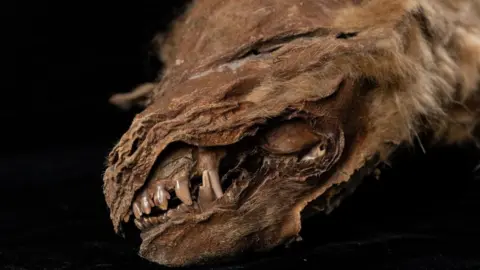Ancient mummified wolf cub in Canada 'lived 56,000 years ago'
 Government of Yukon via EurekAlert!
Government of Yukon via EurekAlert!A wolf cub that was found mummified in northern Canada lived at least 56,000 years ago, scientists say.
Hidden in permafrost for tens of thousands of years, the female cub was discovered by a gold miner near Dawson city in Yukon territory in 2016.
She has since been named Zhur, meaning wolf, by the local Tr'ondek Hwech'in people.
Scientists now say the cub, of which the hide, hair and teeth are intact, is "the most complete wolf mummy known".
"She's basically 100% intact - all that's missing are her eyes," lead author Professor Julie Meachen, a paleontologist and professor of anatomy at Des Moines University in Iowa, told the EurekAlert! science news website.
Using a variety of techniques, the team was able to determine many aspects of the cub's life, from her age and diet to a probable cause of death.
 Government of Yukon via EurekAlert!
Government of Yukon via EurekAlert!The findings, published in the Current Biology journal on Monday, show the cub and her mother had eaten "aquatic resources", including fish such as salmon.
By comparing data from the wolf's DNA and an analysis of her tooth enamel, they found she was likely to have lived and died between 56,000 and 57,000 years ago.
X-rays of the body, meanwhile, found she was around six to eight weeks old when she died.
The study noted that while ancient wolf fossils are relatively common in the Yukon or neighbouring Alaska, mummies of larger mammals are rare.
"We think she was in her den and died instantaneously by den collapse," Professor Meachen was quoted as saying.
"Our data showed that she didn't starve and was about 7 weeks old when she died, so we feel a bit better knowing the poor little girl didn't suffer for too long."
 Government of Yukon via EurekAlert!
Government of Yukon via EurekAlert!
